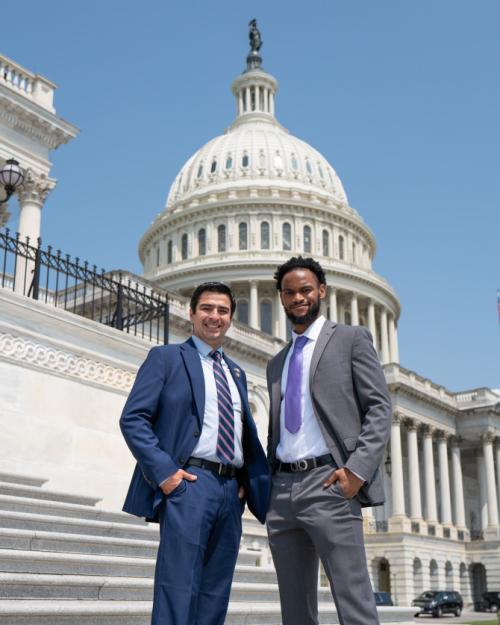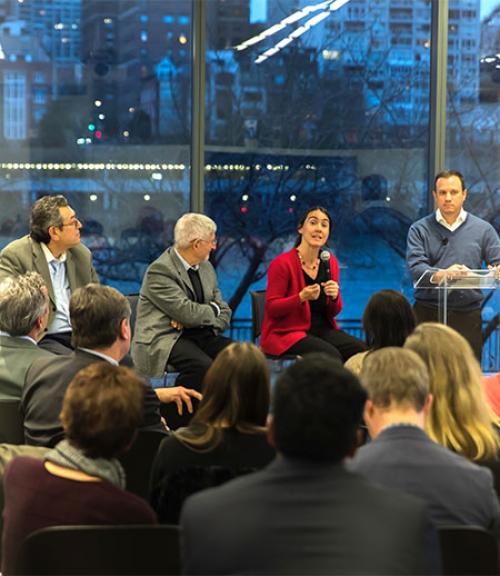The age of artificial intelligence is just beginning.
An avalanche of digital data, combined with sophisticated algorithms to analyze it, heralds a technological transformation as important as the emergence of the internet, said panelists at the launch of the Cornell-r4 Applied AI Initiative, held Dec. 6 at Cornell Tech.
“The world has really undergone a seismic shift,” said Greg Morrisett, dean of Computing and Information Science (CIS) and co-chair of the new initiative, which aims to enable students, researchers and business leaders to solve real-world challenges with AI-powered tools. “The dramatic rise of AI and in particular machine learning has made it possible to extract information from data and perform clustering and classification, make predictions, do all sorts of things in ways that are just stunningly effective.”
The initiative, a partnership between CIS, the College of Arts and Sciences, Cornell Engineering and the artificial intelligence company r4 Technologies, will support curriculum changes and build industry partnerships to tackle some of society’s most stubborn problems. In addition to new classes, master’s students will work with business leaders on relevant research projects. The initiative’s first focus will be on the food industry, seeking to optimize the food chain to better align with demand, which would increase profitability and reduce waste.
“We are building a worldwide coalition of practitioners and doers in applied AI who are going to come together around our new center of gravity,” said co-chair Paul Breitenbach ’92, MBA ’95, founder and CEO of r4. “Bringing together these new amazing technologies to solve these practical problems is exactly what the world needs right now.”
Experts from r4 and Cornell participated in the panel, which focused on the future of AI in business and education and was moderated by Morrisett. Panelist Rachel Bean, senior associate dean and professor of astronomy in the College of Arts and Sciences, said a changing curriculum will better prepare Cornell students for a data-driven future and provide them with a broader, more integrated education.
“These new courses that we’re developing are allowing students to incorporate data analytics, data skills, data literacy in their curriculum, and give them the opportunity to contribute in a real way to real-life problems,” said Bean, a cosmologist who has seen her own research transform because of the vast amounts of data now available about multiple galaxies. “We can use large-scale analyses of data not just to answer industrial questions but to really have a much richer perspective on the world.”
New classes for all students could focus on such topics as the philosophy of technology and the meaning of consciousness and intelligence; large-scale analyses of historical texts; or understanding the impact of data on social justice. A fall 2018 pilot class, Urban Analytics, explored how data can be used to improve people’s lives.
“The idea was to give [students] the sense that the data is being collected by our cities and we can do all kinds of inference and understanding, and build models about how the cities are serving our populations,” said David Shmoys, the Laibe/Acheson Professor of Business Management and Leadership Studies in the School of Operations Research and Information Engineering, who taught the class. For example, students considered whether police stations in Chicago are distributed appropriately by evaluating the city’s minute-by-minute crime data.
“It’s really a great new world, and they see the [computational] power that we can put in their hands very quickly,” Shmoys said.
Shmoys also described his multiyear collaboration with the company that operates Citi Bike, a relationship that helped the bike-sharing operation become more efficient and sustainable – and supplied his own team with data and a demonstration of its impact. Such partnerships offer major benefits, he said, but can take time and effort to build.
“If you look at the business world and the academic world, they’re really different cultures with different timelines and different objectives, and so how you get the two communities to have their incentives aligned so that they work together to a common goal is a big challenge,” he said.
Lance Collins, the Joseph Silbert Dean of Engineering, spoke at the start of the event, held in Cornell Tech’s Bloomberg Center. Panelists Igor Zhuk, r4’s chief data scientist, and David Bradley, r4 executive vice president for solutions, discussed how they help clients make decisions based on data, rather than past experience – an approach with implications ranging from law enforcement to health care to the global food chain.
Panelist Ron Brachman, director of the Jacobs Technion-Cornell Institute at Cornell Tech, said society is still in the earliest stages of the AI transformation – not just in the early innings but “the pre-game warmups.”
“We’ve gone in a certain direction to have incredibly powerful, realistic, useful, impactful outcomes, but if you think about where we have to go, as we swing back and think about complementing that with knowledge and … other elements in the broader picture of AI, the horizon is still quite out there,” he said.




